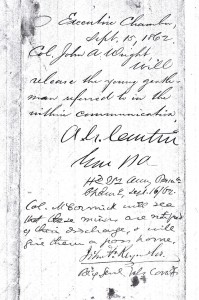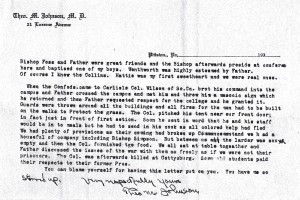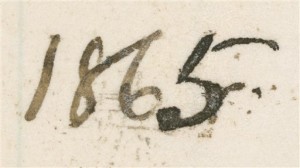I read John Buckless’s book Spies of the Confederacy in order to learn more about the Confederate Secret Service. Buckless references Cloud and Conrad and briefly states that they were college roommates. If this claim could be proven, it would establish that they had a close personal relationship years before their service in the Confederate Secret Service and collaboration on the failed plot to abduct President Lincoln. A footnote in the book attributed this information to the 1854-1858 Diary of Horatio C. King, a Dickinson classmate and future Colonel in the Union army, which was located in the Dickinson College Archives.
I then went to the Dickinson College Archives and pulled out the finding aid for the Horatio King collection and found the box and folder numbers for the 1854-1858 Diary. I read through it and took note of the entries that referred to Cloud and Conrad. The diary mentions that they were friends and members of the Phi Kappa Sigma fraternity along with King, but does not reference the two men’s living arrangements. In an entry about the night before Conrad and the other Phi Kappa Sigma brothers informed Cloud of his induction, he writes that “Conrad, for fear of exciting the suspicion of his chum stayed with me all night.” This statement implies that Conrad and Cloud were rooming together. The diary also references Conrad attending a speech by prominent abolitionist Henry Ward Beecher in Harrisburg and the fact that Cloud was a Democrat and enjoyed discussing politics. This reference led me to question which political leanings were the most prevalent among Dickinson’s studentsand faculty in the years before the Civil War, and how the majority of the campus viewed slavery. I also am puzzled as to why Conrad attended a speech by a well known abolitionist, considering he fought for the Confederacy several years later.
I subsequently sought to determine whether or not Cloud or Conrad were, in fact, roommates. I asked Debbie in the archives if there are any primary sources that document students’ living arrangements, and she told me that Dickinson’s nineteenth century college catalogues often listed students’ room numbers. In order to definitively determine if they were roommates, I read through the Catalogue of Dickinson College for the Academical Year 1857, which is also in the archives. I found that during that year, when Conrad was a senior and Cloud a junior, they lived together in East College Room 24. Historian Patricia Cline Cohen states on page 349 of her book The Murder of Helen Jewett that “sharing beds was a perfectly common practice” for single nineteenth century men, especially those rooming together. This piece of contextual information implies that Cloud and Conrad may have shared a bed at Dickinson. (http://books.google.com/books?id=tbNBRL-llnIC&pg=PA349&dq=roommates+bed+sharing+nineteenth+century&hl=en&ei=kAN1TbTaKsL48Aau7ayGDw&sa=X&oi=book_result&ct=result&resnum=1&ved=0CD8Q6AEwAA#v=snippet&q=bed%20sharing&f=false)
I am also curious about whether upperclassmen were allowed to select their own roommates. If they did, it would lend more credence to the theory that they were very close friends. Regardless, as roommates and fraternity brothers, they likely developed a close relationship years before the outbreak of the Civil War, which lends a different perspective to the narrative of their collaboration on the attempted Lincoln abduction. I am intrigued as to whether Conrad recruited Cloud to join the Confederate Secret Service, or whether he joined on his own and coincidently crossed paths with his old friend.
A historical tour of Civil War Carlisle should definitely include a stop at East College, where the tour guide could discuss Cloud and Conrad. They could describe their role in the Confederate Secret Service and the plot to abduct Lincoln in 1864. They would then explain the fact that they roomed together in East College and give certain details of their time at Dickinson, such as their involvement in Phi Kappa Sigma and Belles Lettres.
Bibliography:
Bakeless, John. Spies of the Confederacy. New York: J.P. Lippincott Company, 1970.
King, Horatio Collins. Diary 1854-1858. MC 1999.9, Horatio Collins King Family Papers, Archives and Special Collections, Dickinson College, Carlisle, PA.
“Junior Class.” Catalogue of Dickinson College (1857-1858).
“Senior Class.” Catalogue of Dickinson College (1857-1858).
Cohen, Patricia Cline. The Murder of Helen Jewett. New York: Alfred A. Knopf, Inc., 1999.



